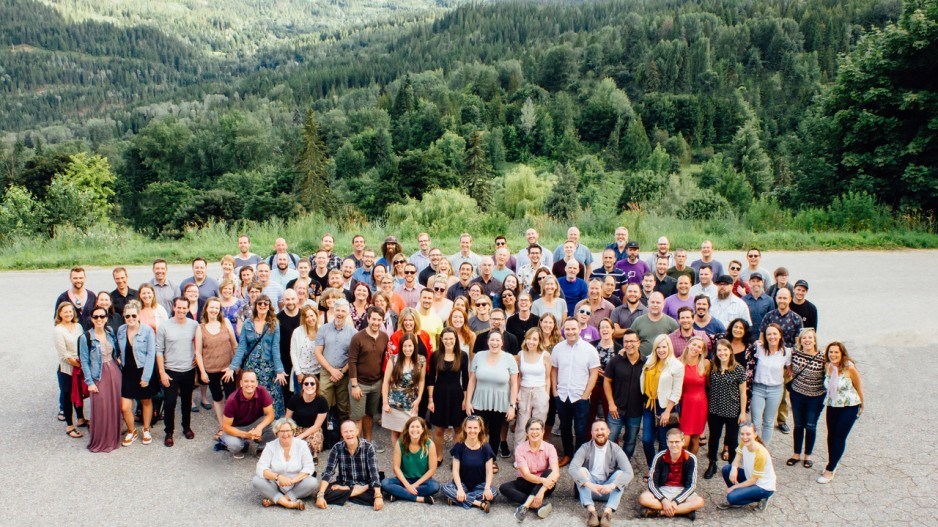For one week in March global use of the Thoughtexchange (Fulcrum Management Solutions Ltd.) platform came to a standstill.
The tech firm, based in Rossland, B.C., had raised $20 million just months earlier as demand was swelling for the platform that crowdsources ideas from groups ranging from 10 to 100,000 people.
That demand evaporated almost instantly at the outset of the pandemic.
“It was terrifying,” recalled CEO and co-founder Dave MacLeod.
Thoughtexchange’s platform allows leaders of organizations to ask open-ended questions to groups, which in turn provide anonymous answers that can be rated by those who may agree or disagree.
Clients have included major corporate players such as American Airlines Inc. (Nasdaq:AAL) and McDonald’s Corp. (NYSE:MCD).
But the paralysis that hit the platform’s use began reversing within a week, and within 20 days use was doubling through to April and May.
“We were up 600% year over year with everyone we were working with because all of the sudden they needed to be having all sorts of conversations at scale, and they had no way to host a town hall meeting and bring everybody in,” MacLeod said.
By late June, Thoughtexchange had raised an additional $10 million from investors as use surged again during the pandemic.
Part of that was spurred on by the global racial justice protests that had begun unfolding in the wake of George Floyd’s killing, pushing companies to more earnestly pursue diversity and inclusion initiatives, according to MacLeod.
“You have to have these conversations at scale now – it’s not if, but how,” he said.
Because Thoughtexchange’s headquarters is comprised of three small offices in the B.C. Interior, it already relied significantly on a remote workforce – 140 employees – ahead of the pandemic.
MacLeod said he’s grateful to have raised $30 million over the past year to keep up with hiring demands, but he said the widespread shift to remote working is a double-edged sword.
“It’s positive from a hiring perspective because we’re seeing amazing talent hiring for the jobs we have posted right now. And we’re aware that the [flip] side of that is they must be applying in a lot of different places, so the competition must also be increasing for awesome talent because there’s no myth that you actually have to be walking into the office to create value,” he said.
Meanwhile, another B.C.-based tech firm posting significant growth, Victoria’s Redbrick Technologies Inc., is taking a different approach to remote working as the pandemic continues.
“It doesn’t really feel right, now, to have no real human interaction at all,” said CEO Tobyn Sowden, adding he was quick to shut down offices after directly observing Silicon Valley’s response to the pandemic during a mid-March trip.
“We’re going to have probably an office primary workplace in the future with remote secondary. Work is obviously going to change forever, and there will be remote aspects, absolutely. We will likely have to compete with companies for talent, maybe worldwide or at least North America. That’s going to mean there are people in certain areas that say, ‘Well, I can remote work for you or I can remote work for someone else.’”
Redbrick launched nine years ago as a marketing company helping software developers acquire new users.
It later shifted its business model to building its own products and acquiring other businesses.
“I think what we saw was that strategy just really start to accelerate through 2019 and then into 2020,” Sowden said.
Redbrick now possess a host of portfolio companies focused on endeavours such as digital publishing, streamlining digital workflows and browser development.
The finance, human resources and creative divisions are shared between each of the separate portfolio companies.
Its latest acquisition, Minnesota-based Leadpages, closed just weeks ahead of the pandemic.
Terms of the deal were not disclosed, but Redbrick estimated at the time the acquisition would bring its 2020 run rate to $80 million.
That was prior to the pandemic, and Sowden acknowledged one portfolio company dependent on ad revenue, Assembly, has not quite met the heights expected following a decline of “up to 40% in revenue in that businesses – not overnight, but over days and weeks” after the pandemic.
The company has tapped the federal wage subsidy program, avoiding layoffs, and Sowden said his eyes are on further acquisitions following the integration of Leadpages into its portfolio over the past seven months.
“We want to do this again,” he said. “We are really excited to look for other companies that we can acquire and grow through that strategy and leveraging everything we know about marketing to date.”




